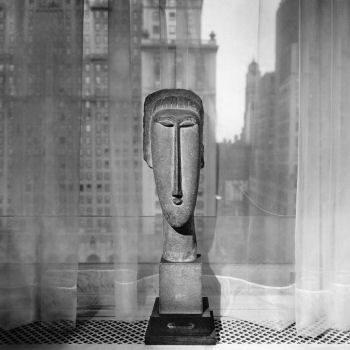“Faith in Strangers” is Andy Stott’s second album of 2014. He released “Drop the Vowels” earlier in the year as one-half of Millie and Andrea. His solo album balances the hard-hitting cacophony of “Drop the Vowels,” with the soothing dub of his 2012 album “Luxury Problems.” it manages to be the best of both worlds, offering both beats and more introspective sounds.
Album opener “Time Away” starts things off slowly with what sounds like a foghorn eventually melting into a wall of ambient swells. “Violence” also starts slowly, with just a synthesizer and a woman’s voice (Allison Skidmore, who was also featured on “Luxury Problems”). Her singing is plaintive but muffled, processed so that it is impossible to make out any words. Drums finally kick in around the three-minute mark, and this is where the song, and the album, really takes off. There are crushing 808s and distorted snares and synths, all slightly off beat. It’s an odd combination of beautiful, banging, and disquieting. It sounds like a fever dream version of trap music.
The mixture of gorgeous vocals, synthesizers, thundering bass, and distortion appears throughout the album. “On Oath” and “Science and Industry” use those elements over a skeleton of minimalist techno. “No Surrender” and “Damage” combine them with drum ‘n bass. “How It Was” applies them to house music. It’s never glitchy or harsh enough to make it difficult to listen to, but it constantly keeps you on your toes. There are two weaknesses that electronic music can fall prey to: it can be too repetitive and predictable, and it can lack any real low ends. Stott solves both problems by keeping his songs off kilter, and backing them with heavy beats.
The title track mixes things up by being less dissonant and more straightforward. I had assumed that the title of the album, “Faith in Strangers,” was meant to be ironic. I was surprised by the sense of hope and optimism in the title track, especially after the darker moments on the rest of the album. “Damage” and “Violence” live up to their namesakes, although even at its noisiest, “Faith in Strangers” can still be beautiful.
The album ends with “Missing,” which like “Time Away” is mostly ambient. It’s an ambiguous way to end things, and it doesn’t tie the album together or make a statement the way some of the other tracks do. Stott seems to be intent on challenging the listener and distancing himself from the dancefloor as much as possible. It may not get him gigs playing stadiums, but it’s what makes his music special. There are no phony builds, no bass dropping, no obvious patterns. “Faith in Strangers” keeps listeners on their toes, and keeps their head nodding the whole time.

